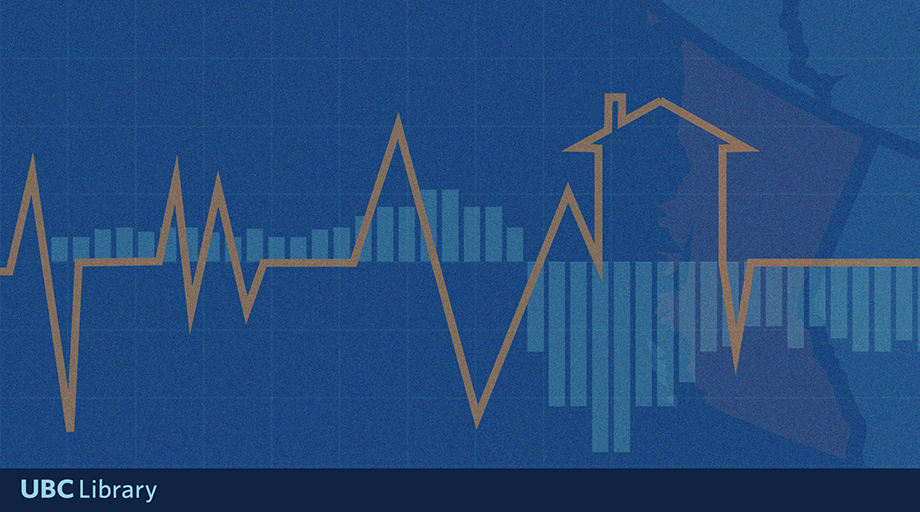
“Everybody on campus wants housing data, and it’s very difficult to get,” says Paul Lesack, Data and GIS Analyst at the UBC Library Research Commons. Some of that data, which Lesack notes is hugely expensive, is contained in the Data Advice and Inventory Extracts provided by BC Assessment (BCA), which include value assessments for just over 2 million properties in British Columbia, along with details about each property’s three most recent sales.
Previously UBC researchers had access to this data through the Sauder School of Business, thanks to Associate Professor Dr. Tsur Somerville, who put in place a licensing agreement with BCA and managed the data distribution on campus. But over time, the arrangement became impractical and sharing the data became more challenging after BCA switched its data delivery model.
“So what Paul proposed, and we pursued, was for the library to take responsibility for managing and distributing the BCA data to researchers at UBC,” says Jeremy Buhler, Data Librarian at the UBC Library Research Commons.
Through the library’s extensive expertise in stewarding licensed data, and the work of Lisa Larkins, E-resources Licensing Specialist, and Sheldon Armstrong, Associate University Librarian, Collections, the license was successfully transferred to UBC Library in December 2020. As per the agreement, access to BCA data is restricted to researchers currently affiliated with UBC, and authorized users can only use the data for non-profit academic research purposes.
“The terms are more restrictive than most of our other data sets,” says Buhler. “Each researcher who wants to use the BCA data needs to set up a meeting with me and agree, in writing, to the terms. There’s a bit of extra work, but in our view, it’s worth the effort for the value that this data set has to researchers.”
The data files released by BCA are converted by the team at the Research Commons from XML into a database format, which Lesack notes involves a substantial amount of work. The data is then added to Abacus, a repository of open and licensed data hosted by UBC Library and used by academic communities at institutions across the province.
“Once users get access, they can go onto Abacus and download the database as one single file, which makes it very easy to distribute, while still maintaining almost all of the traditional benefits of having a database,” says Lesack. From there, researchers can filter the data by region, property characteristics, land use type and more, to do analysis on housing in BC.
“That’s a game changer as far as I’m concerned, in terms of the kind of research that can potentially be done with this data set,” says Craig E. Jones, who is the Research Coordinator for the Housing Research Collaborative at the School of Community and Regional Planning (SCARP) and a Ph.D. candidate in the UBC Department of Geography. “The work that Jeremy, Paul and the others [at the library] have put in makes it possible for someone like me to run simple queries and get the exact kind of output that works for my particular [research] questions.”
The UBC Data Science Institute (DSI) offers a summer 14-week capstone program for graduate and undergraduate students. As part of this year’s Data Science for Social Good summer program, the project team will focus on the BCA dataset and “do a real deep dive,” says Jones.
“One of the three projects selected for this summer is the housing project,” says Dr. Raymond Ng, DSI Director and Professor in the UBC Department of Computer Science. “Our team touches base with Jeremy frequently.” The project will bring together three computer science students under the supervision of Dr. Ng and Dr. Julia Harten, Assistant Professor at the School of Community and Regional Planning, who will also look at creating a pipeline that can clean the data set and perform certain analytics operations, making it more useful to researchers.
“It’s important to let the community know that for research purposes, UBC now has this,” says Jones, and certain housing questions may be possible to answer on a larger scale, much more quickly than before. “Perhaps there are new opportunities for community-university research projects that UBC researchers, faculty and graduate students can start engaging in. I’m not going to say it’s easy, but getting access to the data is a little bit more straightforward now.”
Learn more about the BCA dataset on Abacus and contact Jeremy Buhler (jeremy.buhler@ubc.ca) to request access.
The UBC Library Research Commons is a multidisciplinary hub that supports research endeavours and provides training in research-enabling skills. We embrace both new and traditional exploratory scholarship and provide services, software, and expertise. Our services include expertise in digital scholarship, including geospatial and data services; a digital Scholarship Lab with powerful computers, for research, experimentation, collaboration, and work with big data, consultations and workshops for UBC researchers and once UBC returns to campus, a welcoming space for projects and presentations.
This project is part of UBC Library’s strategic direction to advance research, learning and scholarship.
Learn more about our Strategic Framework.
